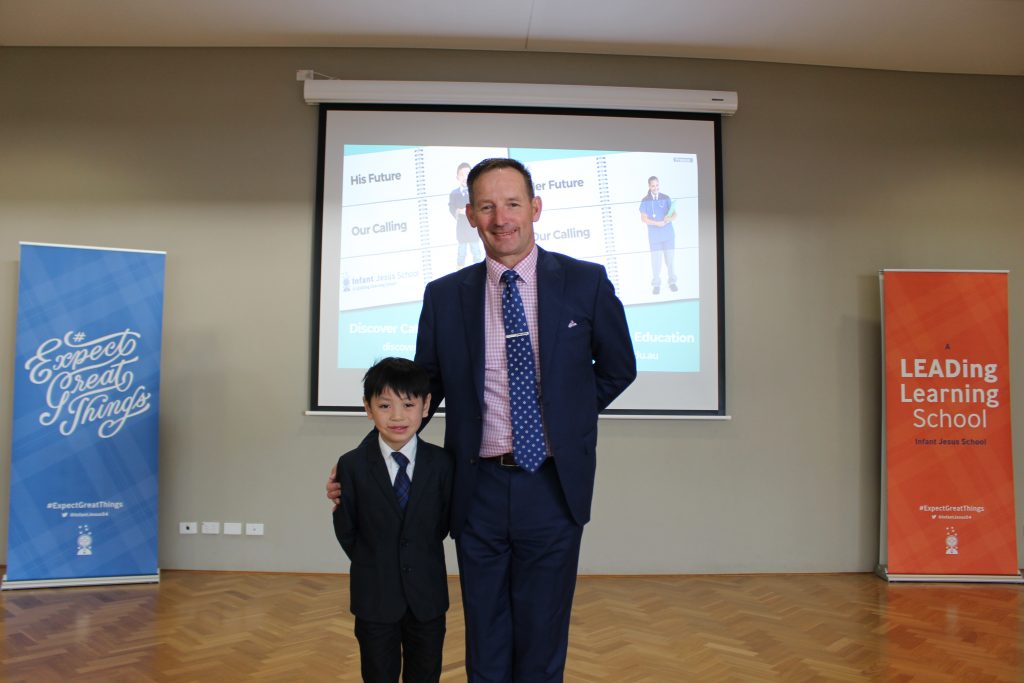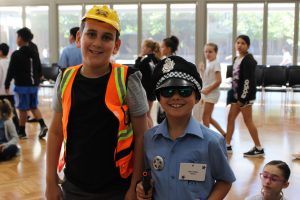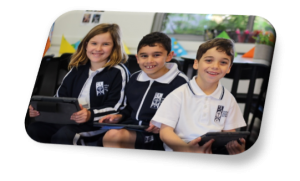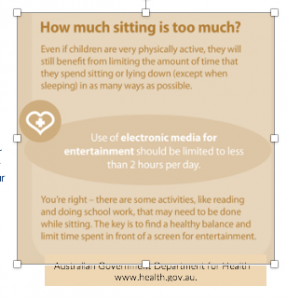

Principal’s Report – Issue 32
Dear Parents
Their future. Our calling. This is the CEWA difference
Today was a very special day at Infant Jesus School where we celebrated the diversity and achievements of every student, as well as the the individuality of each student and their future, while uniting WA Catholic schools under our one calling – to provide a quality, Christ-centred education that is focused on the child.
His/her future → focused on the child
Our calling → to provide a quality, Christ-centred education
One vision → a community united in Christ-centred learning
As parents are aware, our children came to school today dressed as ‘Their Future’. What they imagine themselves to be when they grow up. We had all types of professions and careers, some I had never even heard of and certainly were not around when I was growing up. It is wonderful to see our students so full of hope and confidence about their future.
Thank you to all our Mums and Dads for their support of their children who, along with their teachers and this school, are committed to realising the dreams of your children in an ever-changing world. Thank You for your commitment to Catholic Education.
Technology at Infant Jesus School
There is no question that new technological inventions have transitioned into most aspects of our lives, but is it actually effective or conducive to education? As it turns out, technological advancements may create learning advancements and opportunity.
Infant Jesus School endeavours to provide all staff and students with the skills, tools and a mindset to achieve success in a rapidly changing technological and information rich world. We aim to develop our staff, students and parents into responsible digital citizens who are able to interact collaboratively as members of the connected global community. By integrating digital and communication technologies into all areas of the Australian Curriculum we aim to provide powerful and effective tools to engage students, empower teachers and involve parents in developing lifelong learners.
The world we live in is not the same as it was 15, 10, 5, even 1 year ago. This is a fact. The digital world in which our children exist is changing, and in turn, this is changing the way children think. Children’s brains are being altered by the audio-visual and interactive experiences provided by the digital tools they are exposed to from birth.
Our children are neurologically wired differently than our generation. Their cognitive structures process information in a parallel or simultaneous manner, not sequentially like ours. It is our job as educators to prepare our children to succeed in the world they live in.
As parents are aware, iPads began within our school way back in 2011. Over the years, we have developed the way both the students and the teachers use this device to enhance learning. Using an iPad, schools and teachers can pre-load appropriate, school-based applications for just about any project, make grading and test-taking easier, and create an atmosphere of easily facilitated group projects. Perhaps most importantly, technological devices in the hands of children help them become familiar with and engaged in the technology-driven world we live in.
As our children grow older they will need to become more and more proficient with the use of these devices as they progress through both primary and secondary school.
This technology, the introduction of a one-to-one program has also seen an evolution in classroom design, pedagogy and styles of learning. We believe that:
- All students can learn and do so in a variety of ways.
- Meaningful educational technology integration is an essential element to learning in the 21st Century.
- Effective teacher upskilling is important in raising competencies for all educators, students and parents.
- Technology as a tool is one part of a quality learning process.
- Other effective pedagogical strategies are used in conjunction with technology.
- Technology use in the classroom is neither a substitute, nor a replacement, for tools we are already using.
- Technology is a tool that can be used when they allow for outcomes to be achieved in ways not previously thought possible.
Digital Technologies
Digital technologies are everywhere, mobile and desktop devices and networks are transforming learning, recreational activities, home life and w ork. Digital systems support new ways of collaborating and communicating, and require new skills such as computational and systems thinking. Technologies are an essential problem-solving toolset in our knowledge-based society.
ork. Digital systems support new ways of collaborating and communicating, and require new skills such as computational and systems thinking. Technologies are an essential problem-solving toolset in our knowledge-based society.
Students acquire a deep knowledge and understanding of digital systems, data and information and the processes associated with creating digital solutions so they can take up an active role in meeting current and future needs. Technologies enrich and impact on the lives of people and societies globally. Society needs enterprising students who can make discerning decisions about the development and use of technologies, develop solutions to complex challenges and contribute to sustainable patterns of living. Technologies can play an important role in transforming, restoring and sustaining societies and natural, managed and constructed environments.
The Western Australian Curriculum: Technologies describes two distinct, but related subjects:
- Design and Technologies – in which students use design thinking and technologies to generate and produce solutions for authentic needs and opportunities.
- Digital Technologies – in which students use computational thinking and information systems to define, design and implement solutions.
In an increasingly technological and complex world, it is important to develop knowledge and skills to analyse and creatively respond to design and/or digital challenges. Through the practical application of technologies including digital technologies, students develop dexterity and coordination through experiential activities. Through the practical application of technologies including digital technologies, students develop dexterity and coordination through experiential activities.
 Screen Time & Physical Activity
Screen Time & Physical Activity
There has been much conversation in recent times in both the media and our school community about Screen Time. I think it is important that we clarify what Screen Time is and how it relates to the learning opportunities for our children at Infant Jesus School. Screen time is defined as:
- watching television, DVDs or movies.
- playing electronic games on computers, video game consoles (such as PlayStation or X-box), tablets (e.g. iPad) or handheld electronic devices (e.g. Nintendo 3DS or smartphones), and
- using the internet.
The Australian Parent Website (APW) states that Screen Time can be:
- interactive – for example, playing video games, communicating via Skype, or using online tools to draw pictures.
- not interactive – for example, sitting still and watching movies, TV programs or YouTube videos.
- educational – for example, doing maths homework online.
- recreational – for example, playing games or watching videos for fun.
What do Screen Time limits mean for your child?
The Australian Parent Website suggests that Screen Time limits are about making sure your child enjoys lots of healthy, fun activities – both with and without screens. Limits mean looking at the time your child spends on screens and making sure it doesn’t get in the way of sleep and activities that are good for their development. These activities include things like physical play, reading, creative play like drawing, and social time with family and friends.
Limits don’t mean you should stop your child from watching TV or playing video games because she/he uses screens at school or for homework. According to Melbourne Child Psychology & School Psychology Services, the benefits and importance of screen time are (equally) significant.
- For a start, digital literacy is crucial in many professional careers.
- The use of digital technology will continue to increase momentum in educational settings, so a good grasp of these technologies will likely relate to improved academic performance.
- Screen time has been shown to work well as a sedative and in calming kids down in anxiety-inducing situations, such as before surgery.
- Some aspects of interactive, digital programs can enable greater learning, particularly in children with learning difficulties.
Yet, the purported downsides to ‘excessive’ screen time is that:
- Research has shown that kids who spend too much time in front of screens risk health problems such as obesity and issues with posture.
- The number of short-sighted children has almost doubled during the last five years, which has been attributed to the use of screens.
- There has been a correlation between excessive screen time and reduced levels of enjoyment in other activities, such as outdoor exercise and imaginative play.
- Many children who spend more time on electronic devices have reported feeling less energetic and fit.
However, as the Australian Government Department for Health states (Screen Time and Children) children, aged 5 – 12 years, should spend no more than two hours a day playing computer games, surfing the internet, watching TV or playing video games, for recreation and entertainment. At school we don’t play games or use the electronic devices for recreation or entertainment. Screen Time DOES NOT include time spent using computers and other screen-based activity for homework and study. (Australia’s Physical Activity and Sedentary Behaviour Guidelines Children (5-12 years) Department of Health, 2014).
I think, as parents, we need to understand this difference and the conversation around ‘Screen Time’. The issue is about reducing sedentary behaviour and keeping our children healthy and active. A parent who has ever been involved in parent roster in a class/school would
in a class/school would  agree that a primary school does not promote a ‘Sedentary’ lifestyle . . . Far from it! Furthermore, our children are actively engaged in their learning and not sitting and aimlessly staring at a screen, or are our teachers using the iPad as a classroom/behaviour management control technique.
agree that a primary school does not promote a ‘Sedentary’ lifestyle . . . Far from it! Furthermore, our children are actively engaged in their learning and not sitting and aimlessly staring at a screen, or are our teachers using the iPad as a classroom/behaviour management control technique.
Unfortunately, too many children are involved in a sedentary lifestyle after school hours where things like TV, X-box, PlayStation and electronic devices become the substitute for other means of activity. The Australian Physical Activity and Sedentary Behaviour Guidelines is promoting physical activity and encouraging parents to consider their child’s physical (and mental) health by keeping them active and mobile, by reducing the use of electronic media for entertainment. Again, parents who have been involved in any of our classes over the years would appreciate that our teachers are not using any of our electronic devices for entertainment purposes or time fillers.
Being physically active is good for kids’ health, as well as being a great way for them to make friends and to develop physical and social skills. The brochure provided by the Health Department (www.health.gov.au) presents Australia’s Physical Activity and Sedentary Behaviour Guidelines for all children aged 5-12 years who have started school, irrespective of cultural background, gender or ability. It also provides information and guidance about physical activity, play, sedentary behaviour (sitting) and ‘screen time’ for children.
The digital age in which we live presents us with challenges to ensure that our children are not living a sedentary lifestyle after school hours. As parents we can put parameters around their usage of the electronic devices at home to mitigate the risks and maximise the benefits.
A few tips:
1. Set rules for ‘no screen time situations’ – such as at mealtime, in bed, before school or in the car. These times should be utilised for speaking with your children, discussing their day, preparing for their day and resting — not swiping, watching and tapping.
2. Try to set daily limits — it’s okay to go over these limits every now and then when necessary but treat this extra time a  s a privilege, not a given.
s a privilege, not a given.
3. Combine learning with screen time. Limit the use of simple games or videos and replace them with apps or programs with some educational basis e.g. Mathletics
4. Make sure that screen time does not take precedence over, or replace other important activities, such as exercise, outdoor activities, or reading.
5. Create ‘no screen time zones’ — particularly bedrooms for young children. If the digital screen is going to consume their attention, at least allow them to do it in the living room or in a family setting, as opposed to in isolation in their room.
6. Participate in screen time together! Research shows that using apps or playing digital games together can be beneficial, as it encourages dialogue and conversation — a vital element in the development of verbal skills
Annual Community Meeting
As parent are aware, our Annual Community Meeting will take place on Tuesday 27 November at 7.00pm. Contained within the next few newsletters we will share some further information about the ACM, as well as details about the election process for position on either the School Board or the P&F Association Executive and Committee. We encourage parents to consider assisting the school community by serving on one of these committees.
Interschool Athletic Carnival
Best of luck to all our competitors who will be competing in the Interschool Athletic Carnival tomorrow. We hope you all have a great day and we know you will all be brilliant! Please refer to the Assistant Principal News section of this newsletter for further information.
World Teachers’ Day
An editorial in the newspaper told of a school teacher who asked his class of fourth graders to draw a picture of something they were thankful for. He thought of how little these children from poor neighbourhoods actually had to be thankful for. He knew that most of them would draw pictures of turkeys or tables with food. The teacher was taken aback with the picture Peter handed in – a simple childishly drawn hand. But whose hand?
or tables with food. The teacher was taken aback with the picture Peter handed in – a simple childishly drawn hand. But whose hand?
The class was captivated by the abstract image. “I think it must be the hand of God who brings us food,” said one child. “A farmer,” said another, “because he grows turkeys.” Finally, when the others were at work, the teacher bent over Peter’s desk and asked whose hand it was. “It’s your hand, teacher,” he mumbled.
The anecdote illustrates how teachers, by the simple things they do, play an important role in the development of all children.
We are very fortunate in Australia to have the quality education system that we have in comparison to other parts of the world. Our education system would be non-existent if we did not have people who valued learning and strived to provide our children with experiences and learning situations that enable them to cope with the demands of an ever-changing world.
About World Teachers’ Day
The United Nations Educational, Scientific and Cultural Organisation (UNESCO) inaugurated World Teachers’ Day in 1994. It commemorates the 5 October 1966 joint signing of the UNESCO/ILO Recommendation on the Status of Teachers. In adopting this recommendation, governments automatically recognised the importance of competent, qualified and motivated teachers in society.
While World Teachers’ Day is celebrated internationally on 5 October, in Australia it is celebrated on the last Friday in October – this year’s date being Friday 26 October.
School Disco
Many thanks to our P&F Association for once again organising a wonderful Disco for our students. As we mentioned at the meeting on Tuesday night, our children really look forward to this event each year and this year over 360 children were able to join in the fun. Thank you to all the parents (and teachers) that assisted in some way.
All Saints Day
Next Thursday is All Saints Day. It is a time when we remember all of those saints now in heaven, both known and unknown and reflect on their lives. Saints are great role models and hold a special position within the life of the Church. In Christian belief, a saint is someone who has a deep commitment to Christ and the power of God has been experienced through the saint by others in some way. Such divine power may have been experienced through miracles, inspirational example or some extraordinary work. In recognition of this feast day we will celebrate a whole school Mass commencing at 9am at the Infant Jesus Parish Church. Please remember to have your children at school a little earlier this day so we can move promptly to the parish church at 8.40am. Parents and carers are most welcome to attend.
Whole School Assessments
As part of our focus on improving learning outcomes, all children in Years 1–6 will complete some literacy and numeracy assessments in the next few weeks. The information from these assessments greatly assists with future planning for each year level and gives a ‘whole school picture’ in the areas of literacy and numeracy. This information will assist us in planning for the future educati onal needs of the students within the school.
onal needs of the students within the school.
School Fees
The year is drawing to a close quite rapidly, and there are still a number of families who have outstanding School Fee Accounts. We ask that all families please finalise their School Fees as soon as possible. Opportunities are continuously provided to all families who are experiencing difficulties to discuss their situation with me. Some families have acted on this, and I thank them for their sincerity and honesty. If you are experiencing legitimate difficulties in relation to your school fees, please contact Mrs Irene Baginski at the school office so an appointment can be made with me at a convenient time.
Leaving Families
We currently have a large number of students who are listed on our Waiting Lists, which once again this means that demand far outstrips the places we have available. Therefore, it is greatly appreciated if we know of children not returning in 2019. Parents I ask you to notify us as soon as possible, in writing, if your child/children are not returning next year.
Prayer for the Week
Person of Peace
“Love one another as I have loved you”,
May seem impossible to do,
But if you try to trust and believe,
great are the joys that you will receive.
For love makes us patient, understanding and kind,And we judge with our heart
and not with our mind.
For as soon as love enters
the heart’s opened door, the faults we once saw are not there anymore,
And the things that seemed wrong
begin to look right,
When viewed in the softness of love’s gentle light.
For love works in ways that are wondrous and strange,
And there is nothing in life that love cannot change,
And all that God promised will someday come true,
When you love one another the way He loved you.Amen
Did you Know?
- Leonardo da Vinci was dyslexic, and he often wrote backwards
- You are about 1 centimetre taller in the morning than the evening
- The hash tag symbol # is called an octothorpe.
- The heart pumps about 1 million barrels of blood during an average lifetime.
- The Shroud of Turin is the single most studied artefact in human history.
Thought for the Week
A word of encouragement during a failure is worth
more than an hour of praise after success
Have a Great Week

Paul Hille
Principal
#ExpectGreatThings


© Infant Jesus School 2017
17 Smith St, Morley WA 6062
Tel: (08) 9276 1769 | Fax: (08) 9276 2998
Website by Chameleon Logic








